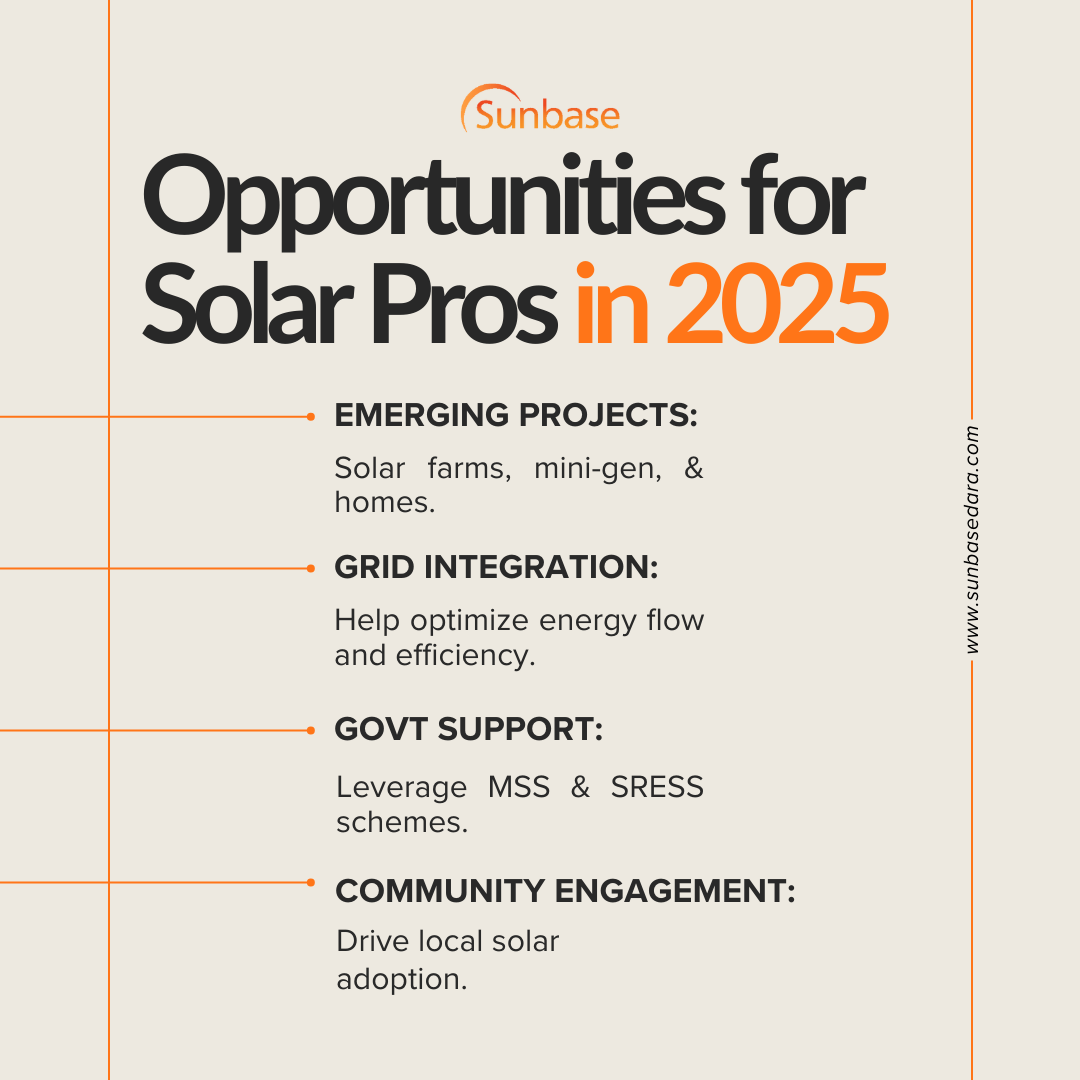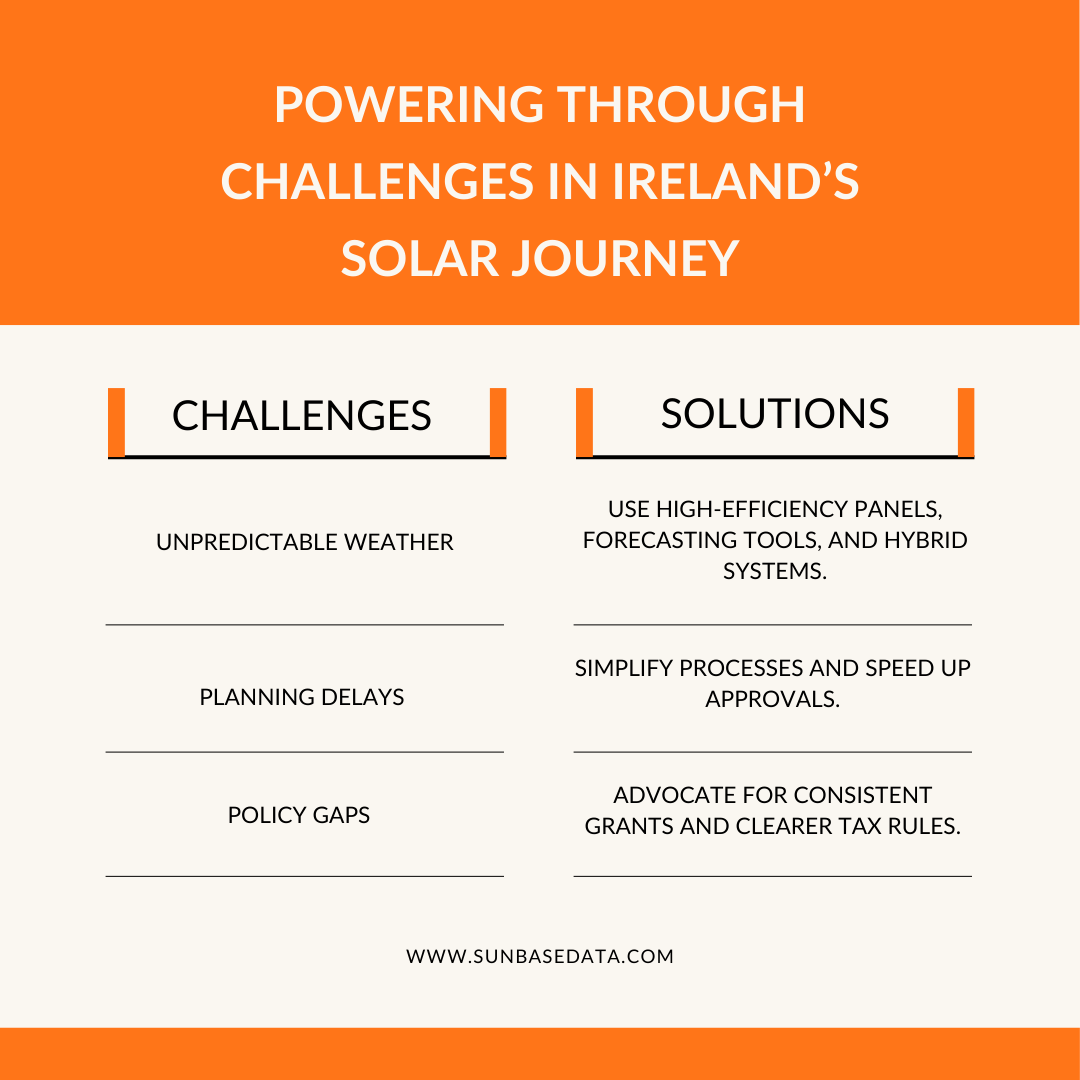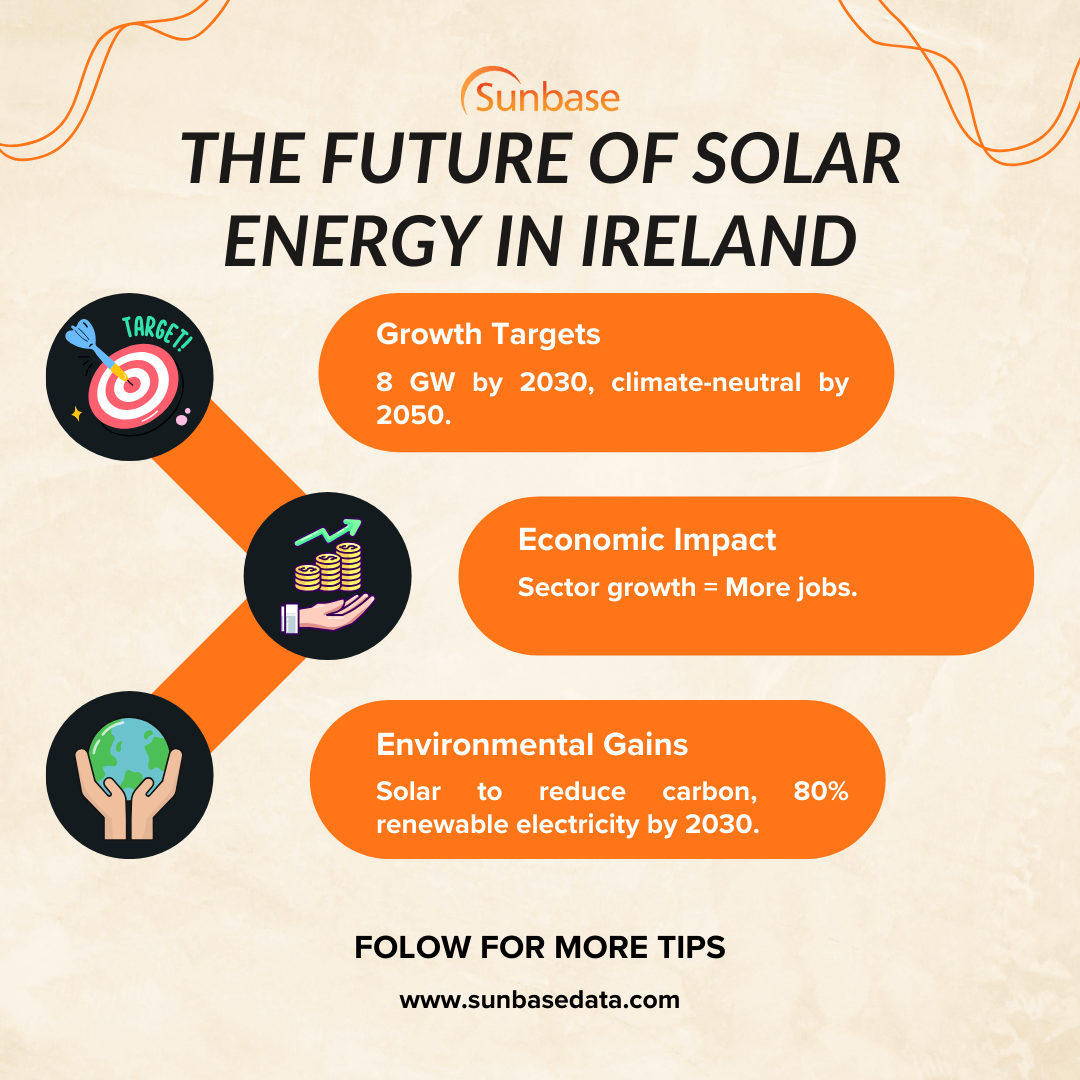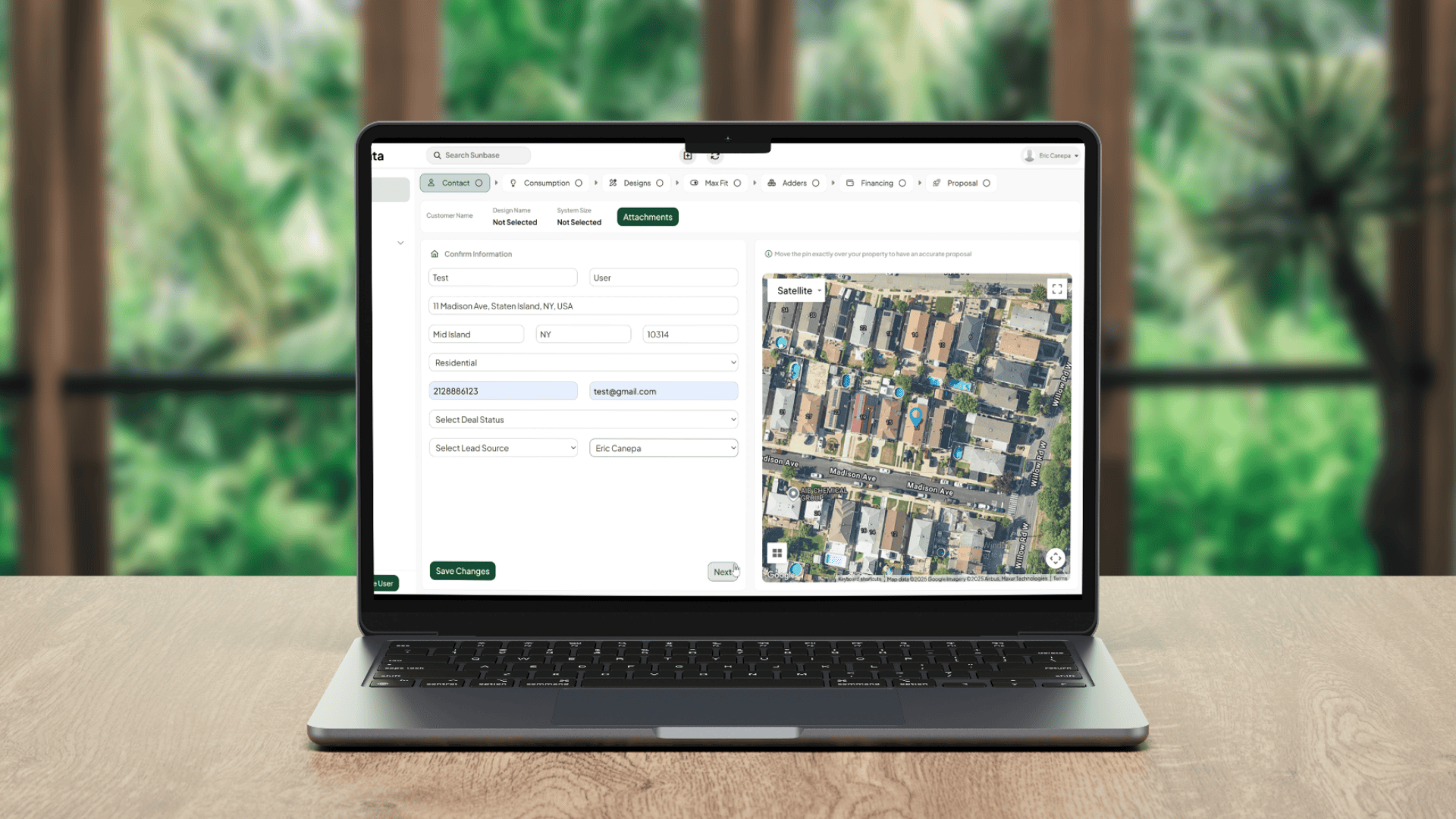January 7, 2025
As we approach 2025, Ireland is accelerating its journey toward a renewable energy revolution, with solar power emerging as a key instrument. The country is known for its temperate oceanic climate and frequent cloudy skies.
Its weather patterns have historically hampered the adoption of solar energy. However, technological advancements and innovative strategies to harness even the dimmest sunlight are reshaping the narrative.
This blog explores the impact of changing weather trends and emerging innovations on Ireland's solar energy capacity. From the Climate Action Plan (CAP) and updated policy frameworks to enhanced solar energy efficiencies and solutions, let's examine what these changes mean for solar professionals.
It will also discuss how they can overcome challenges to thrive in the evolving solar energy market. Stay tuned to gain valuable insights into Ireland's solar prospects.
How Weather Shifts Will Affect Solar Energy in Ireland: What Professionals Need to Know for 2025
Ireland isn’t exactly famous for sunny skies, but solar energy in Ireland is on the rise, and weather shifts in 2025 could change the game. From shifting sunlight patterns to heavier rains, these changes affect everything from system design to performance.
For solar professionals, understanding how climate trends impact installations isn’t optional; it’s the edge you need. Let's find out what’s coming, what it means for solar, and how to prepare for Ireland’s renewable energy future.
Key Takeaways
Here are the key takeaways from the blog:
- Solar Energy Ireland is on a journey toward renewable energy and a sustainable future. Its solar PV systems help generate electricity from sunlight.
- Solar electricity generated in Ireland has experienced remarkable growth, underscoring the increasing contribution of solar photovoltaics to the country’s energy grid.
- With supportive government policies and ongoing technological advancements, the installation of solar panels is becoming increasingly common across the country.
- Solar systems in Ireland face weather challenges and policy issues. However, these challenges can be mitigated with efficient strategies. If the right actions are taken, the future of solar power in Ireland is bright.
The State of Solar Energy in Ireland
Let’s take a closer look at the current solar power landscape of Ireland:
1. Enhanced Solar Capacity:
According to the Irish Solar Energy Association's (ISEA) Scale of Solar 2024 Report, Ireland has observed a 42.6% increase in solar energy production, reaching 1,185 MW. This growth is driven by energy generated from large solar farms, mini projects, industrial initiatives, and residential installations.
2. Irish Government's Targets:
Ireland aims to achieve 8 GW of solar capacity by 2030, with a substantial portion expected to come from rooftop installations.
3. Policy Support:
- The Irish government has implemented various policies to promote the use of solar energy. The Micro-Generation Support Scheme (MSS) offers grants for solar PV installations of up to 50 kW, allowing excess electricity to be sold back to the grid.
- The Small-scale Renewable Electricity Support Scheme (SRESS) offers fixed tariffs for community projects with a capacity above 50 kW and up to 6 MW.
- The Renewable Electricity Support Scheme (RESS) promotes onshore renewable projects through auctions.
- The National Smart Metering Programme aims to install over 2.1 million smart meters by 2025 for a more flexible grid.
4. Technological Advancements:
Innovations in solar technology and energy storage solutions are enhancing efficiency and helping to tackle weather-related challenges.
5. Environmental Impact:
Solar energy projects play a crucial role in reducing carbon emissions and supporting Ireland's climate change goals.
Go Through: How Sunbase Optimizes Solar Installation to Meet Peak Demand Times.
Impact of Weather Shifts On Solar Power in Ireland
Ireland experiences mild and moist conditions year-round because of its proximity to the Atlantic Ocean.
The country's weather patterns are characterized by frequent cloud cover, abundant rainfall, and sudden, unpredictable shifts in weather.
- Cloud Cover: Frequent cloud cover reduces the amount of sunlight available for solar panels. It impacts the efficiency and energy output of solar installations.
- Rainfall: High rainfall can lead to the accumulation of dirt and debris on solar panels. This blocks sunlight from getting trapped by the panels, reducing their efficiency.
- Seasonal Variability: Shorter daylight hours during the winter months result in lower solar energy production compared to longer summer days.
- Temperature Effects: While moderate temperatures are generally favorable for solar panel efficiency, extreme weather conditions, such as heavy rain and strong winds, can affect the durability and maintenance of solar projects.
Must Read: Climate Impact on Solar Panels: How Sunbase Solar Solutions Improves Durability.
Opportunities for Solar Professionals in 2025

The solar industry in Ireland is experiencing growth, creating numerous opportunities for solar professionals. Here are the key areas where they can excel in 2025:
1. Emerging Solar Projects:
With Ireland's target of 8 GW of solar capacity by 2030, there will be numerous large-scale solar farms, mini-generation projects, and residential installations. This will open doors for professionals to work on diverse and ambitious ventures.
As the solar industry expands, there will be a growing need for skilled workers in solar panel installation, maintenance, and predictive weather analytics.
2. Grid Integration:
Grid integration in Ireland strives to accommodate increasing solar capacity. It is crucial and helps to ensure a smooth and efficient energy supply.
Solar professionals can contribute to grid integration projects.
3. Government Assistance:
The government of Ireland has introduced policies, such as the Micro-Generation Support Scheme (MSS) and the Small-scale Renewable Electricity Support Scheme (SRESS), to provide grants and fixed tariffs for solar projects.
Professionals can leverage these incentives to develop and manage solar panel installations that align with national energy goals.
4. Community Engagement:
The renewable energy targets of Ireland provide solar professionals with opportunities to connect with
potential clients who are motivated to adopt sustainable solutions. It can significantly increase the probability of converting potential customers into actual ones.
Engaging with local communities to promote solar energy adoption and develop community-based projects can create new opportunities for professionals. This includes working with homeowners, businesses, and local authorities to implement solar solutions.
This approach creates opportunities for collaboration and fosters public support for renewable energy initiatives.
Worth Reading: 10 Tips for Solar Professionals to Succeed in 2025
Challenges and Mitigation Strategies

While Ireland's solar industry is brimming with opportunities, it also faces its fair share of challenges.
However, solar professionals can overcome these hurdles with the right strategies and help drive the industry forward. Here are some of the challenges and strategies to address them.
1. Unpredictable Weather:
Ireland's variable weather conditions, including prolonged overcast, can negatively impact solar energy
production.
Mitigation strategies include investing in high-efficiency solar panels that can capture even the sunlight scattered by clouds, implementing advanced weather forecasting tools, regular maintenance of solar panels, optimal panel placement, and hybrid systems (combining solar panels with wind power) to access a more stable energy supply.
2. Planning and Permitting:
The National Planning Authority often struggles to resolve solar planning appeals within the required 18 weeks. In many cases, decisions take longer to make. These delays in planning and permitting can slow down the project pace and create uncertainty.
Simplifying these processes and ensuring quicker decisions can help address this issue. It will keep solar projects on track.
3. Policy Inconsistencies:
The gradual reduction in grant support for rooftop solar PV systems under the Micro-Generation Support Scheme (MSS) has become a significant obstacle.
Farmers also get confused about environmental taxes, with the conditions attached to Capital Acquisitions Tax (CAT), Agricultural Relief, and Capital Gains Tax (CGT) Retirement Relief.
These tax issues discourage farmers from offering land for solar projects. Policy discrepancies, especially regarding taxes, make deploying solar energy effectively more challenging.
The key solution to overcome these challenges is to advocate for clear and supportive policies.
Future Projections of the Solar Energy Sector in Ireland

A diverse range of opportunities, achievements, and challenges accompanies Ireland's solar boom. Let’s take a look at what the future holds for solar energy in Ireland.
1. Growth Targets:
Ireland has ambitious goals to reach 8 GW of solar capacity by 2030. This target is sparking major investments and growth in the solar sector.
The Climate Action Plan 2024 (CAP24) envisions Ireland as a climate-resilient, biodiversity-rich, and environmentally sustainable nation. The plan aims to achieve a climate-neutral economy by 2050.
2. Economic Impact:
The solar industry is expected to experience significant growth, creating more job opportunities. Employment in the sector is projected to increase accordingly.
3. Technological Advancements:
Continued innovation in solar technology and energy storage solutions will enhance efficiency and address weather-related challenges, making solar energy more reliable and cost-effective.
4. Environmental Gains:
Solar energy will help reduce Ireland's carbon footprint and contribute to the country's achievement of its climate goals. One goal is to generate 80% of electricity from renewable sources by 2030.
Here's A Global Perspective On Emerging Trends in Solar Energy.
In a Nutshell
Ireland's ambitious sustainable goals position the solar industry for significant growth. It offers both exciting opportunities and challenges.
The Irish Government's inclination towards enhancing solar capacity, supportive schemes, and technological advancements is a key factor driving the nation’s green future.
While unpredictable weather and policy inconsistencies appear to be significant obstacles to substantial renewable electricity generation, innovative solutions and strategic efforts can help overcome these challenges.
Hence, with the right vision and correct actions, 2025 could be a game-changing year for solar energy in Ireland, driving growth, job creation, and environmental benefits.
Stay Ahead of Ireland’s Solar Future With Sunbase
Don’t just react to weather changes, plan for them. With the right software and tools, you can design smarter, forecast performance more accurately, and win more projects.
Sunbase is ready to help Ireland achieve its renewable energy goals. Discover how Sunbase Solar Software can drive the transition to cleaner and greener energy. Contact us here and book your demo to learn more!
FAQs
Q1. What is the future of solar power in Ireland?
According to the Sustainable Energy Authority of Ireland (SEAI) report, in May 2024, solar power contributed 10% of Ireland's electricity on a single day, a significant increase from 0% the previous year. Moreover, solar energy is emerging as a promising resource as Ireland aims to generate 80% of its electricity from renewable sources.
Q2. How can micro-generation solar PV systems contribute to Ireland's energy transition?
By installing micro-generation solar panels, households and small businesses can generate their own electricity. It reduces the burden on centralized power plants.
Q3. How can Ireland protect its solar power from unstable weather?
Ireland can ensure steady solar power generation despite unpredictable weather by adopting hybrid systems, using advanced weather forecasting tools, investing in high-quality solar panels, and properly maintaining them.
One Platform. Zero Chaos. Run Your Entire Business in One Place.
Sunbase replaces your CRM, proposals, scheduling, job tracking, and reporting tools — all inside one clean, connected platform.
About Sunbase
The All-In-One Platform to Run Your Entire Business
Sunbase helps you organize operations, streamline daily workflows, and manage everything - from first customer contact to final project deliver- in one connected system.
Our Mission
- Organize your business.
- Optimize your workflow.
- Automate what slows you down.
Why Businesses Choose Sunbase
One Connected Workflow
Replace scattered tools and manual processes with a single platform that brings together your team, tasks, customers, jobs, and performance data.
🌎 Global Presence
Serving the United States, Canada, India, LATAM, Australia, and 10+ international markets.
👥 11,000+ Users
Trusted by contractors, installers, project managers, sales teams, and field technicians.
🏗️ Built for All Sizes
From small contracting teams to fast-growing enterprises, Sunbase adapts to your workflow.
Useful Links For You
Stop Managing Your Business Manually. Automate It.
Sunbase automates workflows, reduces mistakes, and helps your team get more done - without hiring extra staff or juggling multiple tools.











